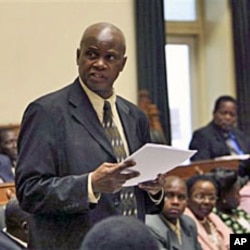Zimbabwe's influential Law Society has launched a draft of a model constitution it hopes will influence negotiations for a new charter. The country is committed to creating a new constitution which will be put to a referendum ahead of fresh elections.
Josphat Tshuma, who is Law Society president and a senior lawyer in Bulawayo, released the organization's draft charter saying they spent more than a year in preparing it. He said the process involved getting ideas from its members and from the public, and consulting experts both inside and outside the country.
Tshuma said a new constitution was an historical moment and the most important law reform since President Robert Mugabe came to power in 1980 after the country won its independence. He said the Law Society was obliged to get involved with drawing up a new charter.
"It is a statutory mandate for the Law Society to peruse, critique and through some informed advice to the legislators on any law reform in Zimbabwe and there cannot be any greater law reform in Zimbabwe than the constitutional drafting that we have embarked," said Tshuma.
Sternford Moyo, a previous Law Society president, said the proposed model constitution significantly reduces concentration of executive power and restores the independence of Zimbabwe's courts.
"The reduction of concentration of power in the hands of the executive. It has a completely new power architecture. It respects democratic rotation. There is a term limitaion imposed on those who hold executive authority of a country," Moyo said.
In addition, power over provinces would by dramatically reduced.
"So there is distribution of power from central government to local government to provincial government both executive and legislative authority," he added.
Moyo said the concentration of power in the executive branch was the most important difference compared with the draft constitution promoted by Mr. Mugabe and ZANU- PF. Known as the Kariba draft, it leaves the presidency with sweeping powers.
The Law Society's model constitution guarantees the right to life, which Moyo said would mean that there would be no death penalty in Zimbabwe.
He also said that people with so-called "natural differences" or homosexuals, have the same rights as any other person - a significantly widening of the bill of rights. Homosexuality is illegal in Zimbabwe and Mr. Mugabe has said he despises people with sexual differences.
Property rights would be enshrined in the constitution giving people the right to go to the courts over loss of property.
Moyo said the Law Society draft ruled out impunity and suggsted a commission be formed that is committed to recovery of the truth to protect citizens from suffering injustice in the future.
"We also need to be able to commit ourselves to the never again slogan , never again will we allow this to happen, and the only way in which we can make that commitment is if we know exactly what happened so that in the future we are able to guard against its recurrence," Moyo said.
Most political analyts say a new constution will emerge after intensive negotations between the three parties which make up the inclusive government.
Next week the Law Society hosts its summer school program and said it hopes negotiators from the three political parties will attend and debate its model constitution.





